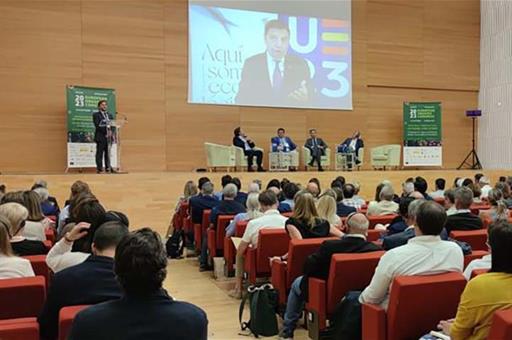European Congress on Organic Production
Luis Planas stresses that organic production is key to tackling the challenge of climate change
News - 2023.9.26
Luis Planas took part, via a video, in the inauguration of the European Congress on Organic Production being held in Córdoba, within the framework of the Spanish Presidency of the Council of the European Union until 28 September. The meeting, organised by the Ecovalia association and Organics International (formerly known as the International Federation of Organic Agriculture Movements) (IFOAM), is organised in collaboration with the ministry and focuses on sustainable, innovative and organic food systems.
According to the minister, Spain is a key player in fulfilling the agricultural dimension of the European Green Pact and, specifically, in achieving the objective that 25% of agricultural land should be devoted to organic production by 2030. After growing again in 2022, the organic area is now close to 2.7 million hectares.
The acting minister has announced some of the main data on organic production statistics, relating to the financial year 2022.
Spain, one of the world's leading producers
European Congress on Organic Production
According to these data, during the year 2022, the area dedicated to organic production in Spain increased by 1.5%, to a total of 2,675,331 hectares. This is equivalent to 11 % of the country's utilised agricultural area. This makes Spain one of the top 10 producers in terms of surface area, both in the EU and in the world.
Planas stressed that these good figures are largely due to the work of more than 60,000 operators who, within the framework of organic food, have promoted more than 65,500 activities throughout 2022, which represents an increase of 4.98% compared to 2021. Primary producers, importers, exporters and traders are the categories of activities that have increased the most.
The Ministry's report, which compiles data from the autonomous communities, shows that Andalusia is the community that devotes the most hectares to organic farming (47.33 % of the national total), followed by Castile-La Mancha (15.42 %) and Catalonia (9.60 %).
In crop production, there have been notable increases in hectares devoted to banana and tropical fruit trees (up 15 %), industrial crops and nuts (up 10 % each) and green harvesting plants for animal feed (up 9 %).
In terms of animal production, the figures show an increase in the number of organic livestock farming activities, which at the end of last year stood at 9,393, 1.58% more than the previous year, mainly due to the increase in beef (+4.59%), sheep (+1%) and goat (+1.93%) activities.
With regard to organic fishery products, there has been a decline in organic aquaculture, which has decreased its production to 4,023 tonnes (-17%). The production of organic mussels is still the largest in terms of volume, with 2,144 tonnes, and is concentrated entirely in Galicia.
Industrial activities related to this organic sector in both plant and animal production have grown by 0.36 % to 10,959. The most numerous are the handling and preservation of fruit and vegetables and the production of beverages, meat and dairy products.
CAP eco-schemes, another example of sustainability
During the inauguration of the congress, Luis Planas stressed the importance of eco-schemes as another example of sustainability. The minister recalled that these practices are one of the major new features of the Common Agricultural Policy (CAP), which began to be applied this year. Three out of four farmers and stockbreeders have made use of the eco-schemes, with more than 19 million hectares, or 87% of the total national area declared.
"It is an effort towards sustainability that is not easy," according to the minister, because it involves higher costs and is subject to strict EU regulations. However, Planas assured that "organic farming and food production will always have a specific place in the actions of the Spanish government and the Spanish presidency of the European Union, which it currently holds".
Non official translation





